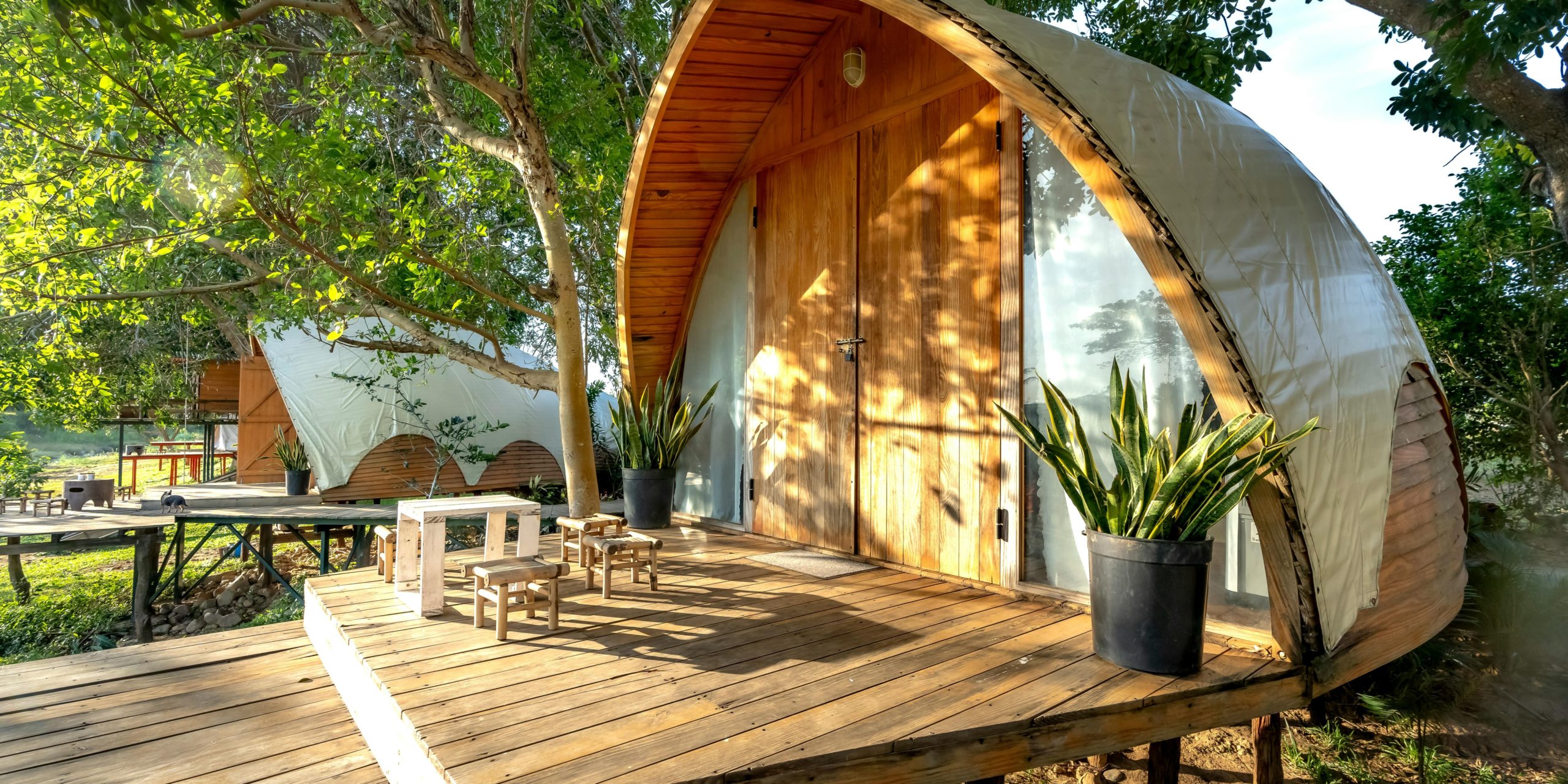🌿 Eco-friendly hotels: When travel meets planet-friendly choices
Traveling is a true joy, but more and more travellers are seeking to combine exploration with environmental awareness. You may have already heard of eco-friendly hotels—those establishments that put the planet at the heart of their mission. But what exactly is an eco-friendly hotel, and more importantly, why should you consider staying in one during your next getaway?
Key takeaways:
- Eco-friendly hotels combine comfort with sustainable practices.
- They aim to minimise their ecological impact while offering a pleasant experience.
🌎 Why hotel trade needs to change
The hotel industry has a significant impact on the environment. Here are a few key figures:
- On average, a hotel consumes 300 megajoules of energy per square meter per year—the equivalent of a typical household’s annual consumption.
- A 100-room hotel uses approximately 289,700 litres of water daily.
- Food waste is a major issue: up to 30% of food served in hotels ends up in the trash.
- The hospitality sector generates tons of plastic waste each year from single-use packaging, water bottles, and toiletries.
In response to these alarming numbers, many hotels are turning to eco-friendly practices.
🌱 What is an eco-friendly hotel?
An eco-friendly hotel integrates sustainable, environmentally conscious practices into its daily operations. This involves optimising the use of resources (energy, water, waste), using eco-friendly materials and products, and engaging socially and economically with the local community. The goal is to minimise environmental impact while still providing a high-quality guest experience.
Key takeaways:
- An eco-hotel reduces its ecological footprint.
- It provides comfort while integrating sustainable practices.
♻️ Concrete commitments from eco-friendly hotels
- Sustainable resource management
Eco-friendly hotels often rely on green energy. Solar panels, geothermal systems, LED lighting, and quality thermal insulation are just a few initiatives that help reduce energy use. Water-saving devices like low-flow faucets and rainwater harvesting systems are also common.
Key points:
- Use of renewable energy: solar, geothermal, LED.
- Water-saving equipment: low-flow systems, rainwater collection.
- Waste reduction and eco-conscious products
Eco-friendly hotels go beyond cleanliness—they clean consciously. Waste sorting is encouraged in both rooms and communal areas. Cleaning products are often organic and non-toxic. Packaging is reduced as much as possible, especially by eliminating single-use plastics like bottles and wrappers.
Key points:
- Waste sorting in rooms and shared spaces.
- Use of organic, non-toxic cleaning products.
- Elimination of single-use plastics (straws, bottles, wrappers).
- Local and responsible food choices
Eco-friendly hotels prioritise local, organic, and seasonal products. Breakfast may include fresh market fruits, while meals often feature local producers. Some establishments also work to reduce food waste with portion control or composting.
Key points:
- Use of local, seasonal, organic ingredients.
- Support for short supply chains.
- Food waste reduction through composting and adjusted portions.
- Eco-designed buildings and responsible architecture
Some eco-hotels go further by using recycled materials or constructing buildings with sustainable resources. Eco-conscious design extends to the architecture, with structures that blend into the landscape and protect local biodiversity.
Key points:
- Use of recycled and sustainable materials (certified wood, natural insulation).
- Non-toxic paints and recycled furniture.
- Bioclimatic architecture and green roofs to support biodiversity.
- Social engagement and local economy support
Eco-friendly hotels also support local communities by hiring regional artisans and producers. They may participate in cultural or wildlife conservation projects. This offers guests an authentic experience while supporting the local economy.
Key points:
- Collaboration with local artisans, producers, and guides.
- Involvement in preserving local culture and wildlife.
- Hiring of local staff.
- Guest involvement in green practices
The most committed eco-hotels also encourage guests to take part in sustainable actions:
- Providing bikes to avoid car use.
- Hosting workshops on permaculture, recycling, or natural cosmetics.
- Organising local environmental activities (beach cleanups, tree planting).
- Zero-waste hotels
Some hotels adopt a zero-waste approach by drastically cutting waste:
- Elimination of single-use plastics.
- Compost systems for organic waste.
- Bulk toiletries (refillable shampoo and soap dispensers).
- Up cycled or recycled furniture and decor.
🌍 How to know if a hotel is truly eco-friendly
Several eco-labels, such as Green Key or the EU Eco label, ensure that hotels meet strict environmental criteria. These certifications offer reassurance, but even without labels, you can check an establishment’s eco-commitment by reviewing their practices.
Key takeaways:
- Look for official eco-certifications.
- Transparent hotels openly communicate about their sustainability efforts.
What about hotels without a label?
Not all eco-conscious hotels are officially certified—but that doesn’t mean they’re not committed. Here’s how to assess them:
- Carefully read the hotel description for mentions of green initiatives.
- Check guest reviews for signs of eco-friendly practices.
- Ask the hotel directly about their sustainability measures.
🧳 Why choose an eco-friendly hotel?
Staying in an eco-friendly hotel goes beyond being trendy—it’s a conscious way to travel more sustainably while still enjoying high-quality service. It’s a thoughtful act of consumption that supports local initiatives and sets a positive example for the tourism industry.
Key takeaways:
- Eco-hotels allow you to travel sustainably.
- It’s a positive action for both the planet and local communities.
✨ Conclusion: Traveling differently — for yourself and the planet
Choosing an eco-friendly hotel is more than just following a green trend or easing your conscience. It’s a true act of commitment — a way to travel in line with your values, reduce your environmental impact, and support a form of tourism that is more respectful, more sustainable, and more mindful.
In a world facing an urgent climate crisis, every action counts. Tourism is not exempt from this responsibility; in fact, it has a major role to play. By staying in eco-designed accommodations powered by renewable energy, actively supporting the local economy, and minimising waste, you become part of the solution. You prove that it’s possible to enjoy a meaningful getaway without compromising the planet’s health.
But this choice doesn’t just benefit the environment — it enhances your travel experience. Eco-conscious hotels often offer authentic destinations, genuine encounters, delicious local cuisine, and a thoughtful approach to overall well-being. Sustainable tourism is also quality tourism: human-centered, nature-focused, and ethically driven.
And by supporting these types of establishments, you help shape the future of the hospitality industry. You encourage more hotels to take action, more travellers to rethink their habits, and you demonstrate that a different model is not only necessary — it’s desirable.
So, the next time you’re planning a trip, ask yourself: what if I made a choice that truly makes a difference? 🌱
Illustrative photo: canva.com














